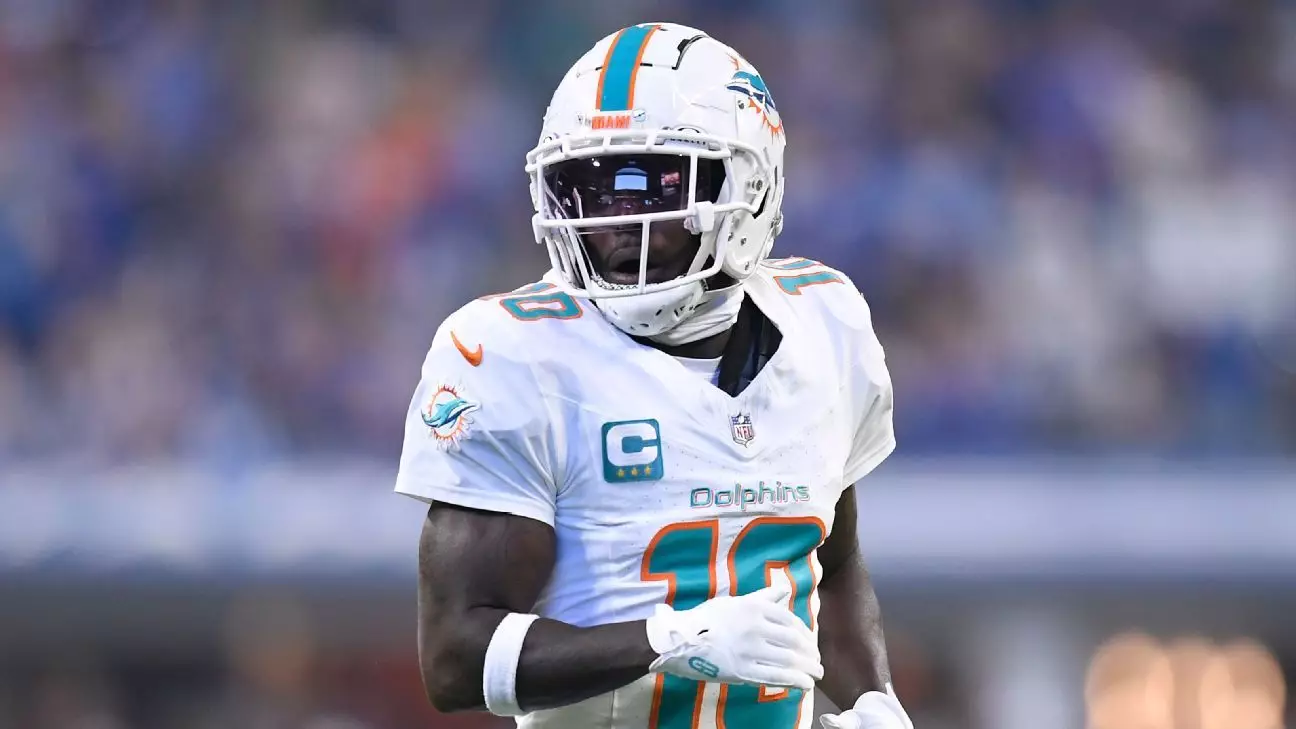The recent upheaval surrounding Miami Dolphins wide receiver Tyreek Hill offers a troubling glimpse into the life of a professional athlete caught in disarray. A domestic disturbance at his Sunny Isles Beach home on a Monday evening brought police to his door after Hill’s mother-in-law expressed concern over his behavior. Described as “very aggressive and impulsive,” the incident was alarming enough that police were called to ensure the safety of Hill’s wife, Keeta Vaccaro. Though no charges were filed, the reported details paint a portrait of instability, raising eyebrows and concerns among fans and commentators alike.
The argument reportedly escalated when Vaccaro confronted Hill about his perceived lack of involvement in their daughter’s life. The situation deteriorated, culminating in Hill allegedly throwing a laptop and taking their four-month-old daughter onto a balcony. Such displays of impulsion highlight a concerning trend, identifying Hill not merely as a sports figure but as someone grappling with personal turmoil. The tragedy here is not just an isolated incident; it represents a troubling continuum of concerning behavior off the field, throwing into question Hill’s maturity and ability to handle pressure.
The Examination of Personal Relationships
Tyreek Hill’s relationship with his wife is under intense scrutiny. Reports indicate they have sought couples therapy amid frequent arguments, suggesting that the couple has been struggling with communication issues for a significant period. The fact that Vaccaro is reportedly in the process of filing for divorce adds a layer of complexity to the narrative. It evokes questions around mental health and emotional wellbeing, both within the framework of a marriage and the broader context of a high-profile life.
The visible bruise reported on Vaccaro raises ethical questions about the implications of such incidents. While Hill’s assertion that the injury was an “accident” casts doubt on the severity of the altercation, it does not erase the need for deeper reflection on his behavior. Emotional arguments can easily flare into actions that leave irreversible marks, both physically and mentally. This incident, while described as non-violent, offers an uncomfortable reminder that the lines between conflict and aggression can sometimes become indistinct.
A Pattern of Controversy
Beyond this latest scare, Hill’s history of incidents paints a troubling picture that reveals a pattern. From being investigated for assaulting an employee at the Haulover Marine Center to the civil lawsuit filed by influencer Sophie Hall, Hill’s off-the-field actions raise questions about accountability and responsibility in professional sports. The fact that he faced no disciplinary action from the NFL in these matters compounds the issue, suggesting a concerning culture where talent can sometimes overshadow accountability.
The alarming frequency of these incidents suggests a need for stricter measures to be taken in professional sports. While excelling on the field, athletes like Hill can often afford to sidestep the consequences of their actions. This cycle perpetuates itself, leading not only to personal drama but also risking the integrity and image of the teams they represent.
Challenges and the Path Forward
The Miami Dolphins’ response to the situation—focused on moving forward—offers a glimpse into how teams often navigate personal crises among their players. Coach Mike McDaniel’s expectation for Hill to remain with the team indicates a level of optimism, perhaps naively downplaying the seriousness of the circumstances. While athletes are carefully managed, their personal issues exist outside the realm of team operations, creating a duality that is hard to reconcile.
The commitment of the Dolphins to rework Hill’s contract before the 2024 season demonstrates that teams continue to place value on his performance, despite personal issues impacting his life. This renewed financial commitment also raises ethical questions: are teams enabling harmful behaviors by rewarding disruptive athletes, purely for their athletic prowess? It seems that, unless posed with a clear obligation to support athletes in their mental and emotional challenges, teams will continue to prioritize immediate returns over long-term well-being.
Hill’s experience highlights an urgent need for adequate support systems within sports organizations, pushing for greater scrutiny, deeper conversations about mental health, and proactive measures to help athletes lead holistic lives. Through the lens of his troubling circumstances, we must consider the broader implications of celebrity culture and accountability, both on and off the field. The hope remains that positive change can emerge from these turbulent waters, enabling athletes like Hill to not just thrive in their careers but to also find peace and stability in their personal lives.

